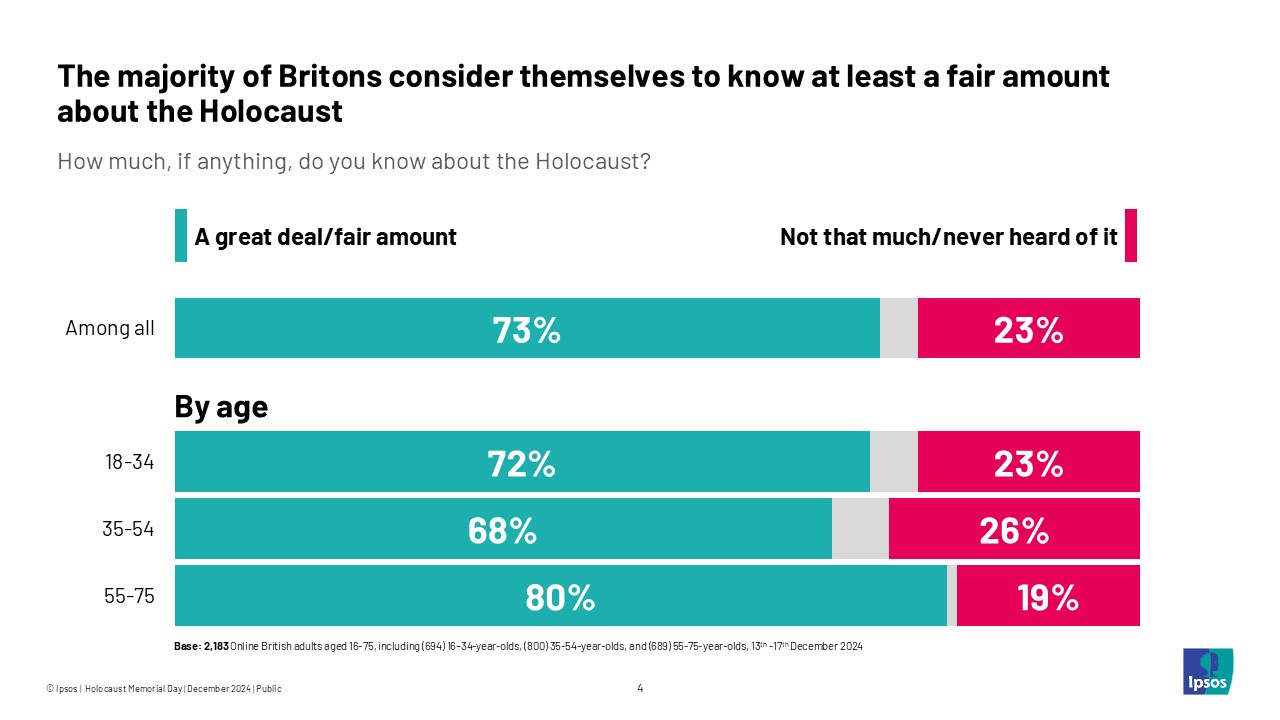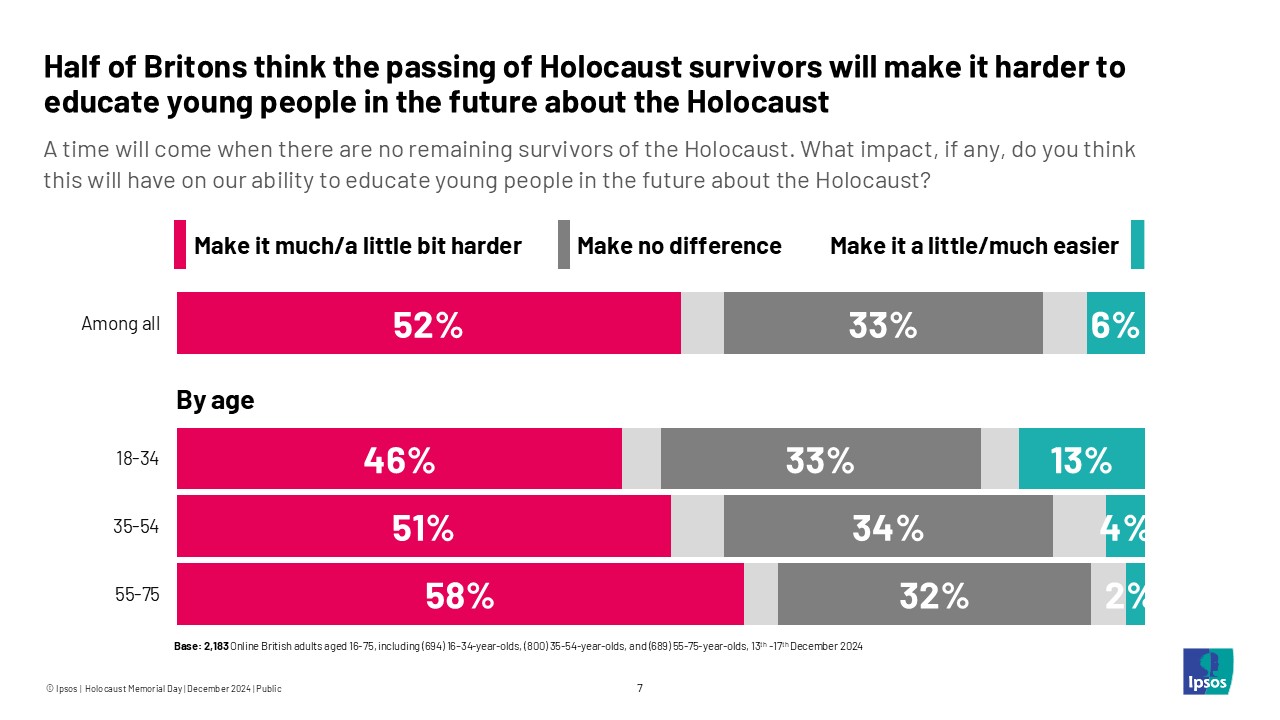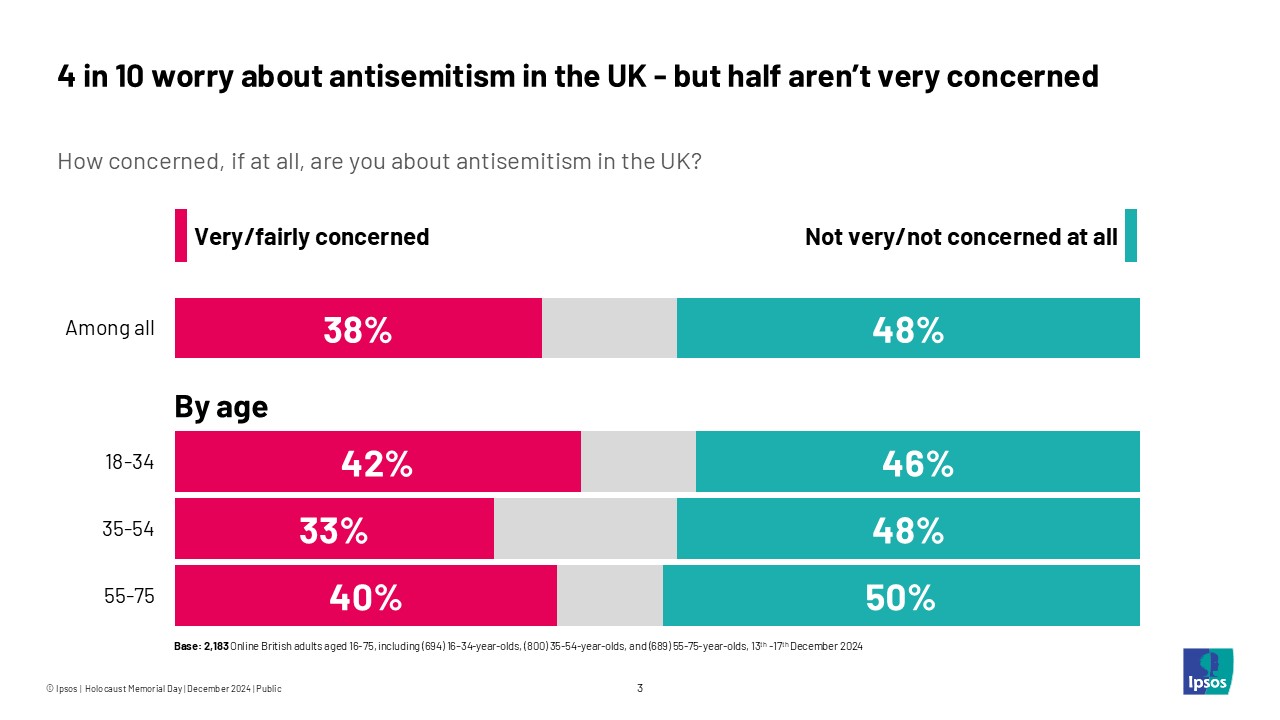Majority of Britons believe it is important to talk about the Holocaust, with 1 in 3 fearing lessons will be forgotten in 10 years’ time
New research from Ipsos, carried out from 13th-17th December 2024, examines public opinion in Britain towards antisemitism and Holocaust education. The polling was conducted in partnership with the Holocaust Educational Trust (HET) ahead of Holocaust Memorial Day, which is marked on January 27th to coincide with the anniversary of the liberation of Auschwitz-Birkenau. This year’s commemorations will mark the 80th anniversary of the concentration camp’s liberation.
Views on Holocaust education
- Holocaust knowledge: A majority (73%) of Britons believe they know a great deal/fair amount about the Holocaust. However, nearly a quarter (23%) admit to not knowing that much/never having heard of it. Knowledge is highest among Britons aged 55-75, with eight in ten (80%) saying they are knowledgeable about the Holocaust.

- Importance of discussing the Holocaust: An overwhelming majority (85%) of respondents believe it is very/fairly important to discuss the Holocaust in the present day. A small minority (9%) disagree. Those aged 55-75 are most likely to agree, with 92% saying it is important to discuss the Holocaust in the present day.
- Remembering the Holocaust: While seven in ten (69%) Britons believe the lessons of the Holocaust are largely remembered today, 1 in 3 (32%) think they will be forgotten in ten years’ time, rising to nearly half (47%) who think they will be forgotten in 50 years’ time.
- Impact of survivor loss: Half (52%) of Britons believe the passing of Holocaust survivors will make it harder to educate young people about the Holocaust in the future. A third (33%) believe it will make no difference, while 6% believe it will become easier.

- Parental views on Holocaust education: Elsewhere in the poll, parents were also asked whether they believe that schools in Britain do a good or a bad job teaching children about the Holocaust. Two in five (38%) parents believe schools in Britain do a good job teaching children about the Holocaust, while one in five (19%) think they do a bad job. A sizable minority (28%) believe schools do a neither good nor bad job.
Antisemitism
- How much of a problem is antisemitism in the UK? Four in ten Britons (39%) think antisemitism is a very or fairly big problem in the UK, but as many describe it as not a very big problem / not a problem at all (40%).
- Concern about antisemitism: Half of Britons express little or no concern about antisemitism in the UK (48%), compared to two-fifths (38%) who are very/fairly concerned. Concern is slightly higher among younger and older Britons (42% of those aged 16-34 and 40% of those aged 55-75) than those aged 35-54 (33%), who are more likely to say they don’t know (19%).

Gideon Skinner, Senior Director of UK Politics at Ipsos said:
Our new research in partnership with the Holocaust Educational Trust reveals 4 in 10 Britons are worried about antisemitism in the UK, although as many don’t perceive it to be a significant problem. At the moment awareness of the Holocaust remains high, and there is widespread support to continue discussing its lessons in the present day – but there is an expectation that its memory will fade over time, especially with the passing of survivors.
Karen Pollock CBE, CEO of the Holocaust Educational Trust, added:
It is heartening to see that an overwhelming majority of the British public agrees on the importance of discussing and learning about the Holocaust. But at the same time, it is deeply troubling that this survey shows half of Britons are not concerned about antisemitism in Britian today. There is a disconnect here. British Jews are small in number, yet we are witnessing the highest recorded levels of antisemitism in living memory. Educating and remembering the past is crucial, but we must also remain alive to the dangers we face today. Complacency is not an option.
Technical note:
- Ipsos interviewed a representative sample of 2,183 British adults aged 16-75. Interviews were conducted online between the 13th-17th December 2024.
- Data are weighted to match the profile of the population. All polls are subject to a wide range of potential sources of error.
- About the Holocaust Educational Trust: For more than 30 years the Holocaust Educational Trust has been working tirelessly to establish and improve Holocaust education in the UK. In 1991 it successfully campaigned for the subject to be included on the National Curriculum and today it works in schools, universities and in the community to raise awareness and understanding of the Holocaust, providing teacher training, an Outreach programme for schools, teaching aids and resource material. They have also developed a network of thousands of Ambassadors, who share their experience with their school and local community. Since 1999 the Trust’s Lessons from Auschwitz Project has given tens of thousands of post-16 students and teachers the opportunity to visit the former Nazi concentration and death camp Auschwitz-Birkenau as part of a four-part educational programme. Since 2006 the Project has received Government funding for the project, which operates in all four nations of the UK.




